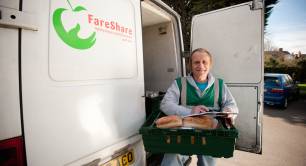Enough limitations: wishlists submitted for overhaul of Social Investment Tax Relief
Social Investment Tax Relief arrived in 2014, aiming to make the UK ‘the easiest place in the world to invest in social enterprise’. Five years on, there's still much frustration. A government consultation, which closed last week, was a chance for social enterprises and their support organisations to share exactly what they thought – and they didn’t hold back
UK organisations have called for an overhaul to Social Investment Tax Relief (SITR) in their responses to a government consultation that closed last week – claiming changes could unlock tens of millions of pounds in financing.
The scheme was introduced in 2014, offering a tax break to individuals investing into charities and social enterprises that translates into 30% of the value of their investment off their next income tax bill. It means investors can offer small amounts of capital at a lower rate of interest than they would otherwise need to justify the risk, and in some cases provides an incentive to invest in the first place.
But commentators have repeatedly criticised the relief for falling short of expectations. A study published earlier this year by Social Investment Business found that while the Treasury predicted £83.3m worth of investment in its first three years of operation, the actual figure was £5.1m – and after over four years of activity, only 63 deals had been completed.
More recent figures from Big Society Capital, taken from its live, open-source database on 17 July, found that at least 69 social enterprises and charities had raised more than £11.6m since SITR’s launch in April 2014. The data only covers deals known to them and so is likely a significant underestimate, but the actual number would still fall far short of the potential: Big Society Capital estimates that some 30,000 social enterprises and charities “could realistically consider” using SITR.
Filling a critical gap, but “essential changes” needed
After gathering responses from social enterprises and charities, Big Society Capital – which has a mandate to grow the UK’s social investment market – has now called on the government to make “essential changes”. These include expanding eligible activities to include the hire of assets on a short-term basis, such as leasing sports facilities, which it estimates would expand the scope of those eligible for SITR to the tune of at least £38m over the next five years. It also wants an end to the age limit: currently, organisations over seven years old cannot use SITR, which Big Society Capital believes “is significantly limiting” its uptake and which, if removed, could enable investable deals of at least £42m over the next five years.
The seven-year limit is “significantly limiting” SITR’s uptake and if removed, could enable investable deals of at least £42m over the next five years
Big Society Capital CEO Cliff Prior said SITR “fills a critical gap in financing” and “importantly, also enables more people to invest in line with their values, often within their own community”. Members of the public can invest small amounts through crowdfunding platforms such as Ethex or Crowdfunder; larger amounts through Resonance (pictured above, with investee Wildgoose Rural Training) and Social Investment Scotland SITR funds; or directly in ‘DIY’ deals.
But to reach its potential – and to fulfil what he called the opportunity for the UK to be “a world leader” in social investment – the government needs to expand both the reach of SITR and its ease of use. He added: “We believe the current model is based too closely on other, more commercial tax reliefs, such as the Enterprise Investment Scheme (EIS). The key difference is the need not only to support start-ups, but to level the playing field, as social enterprises and charities find it harder to access finance than their commercial counterparts.”
Community energy: the only lever available
Community energy – community-led renewable energy, energy demand reduction and energy supply projects – is not currently eligible for SITR, despite government promises in recent years that it would be after eligibility for other reliefs was withdrawn.
In a draft submission shared with Pioneers Post, Community Energy England – which represents 220 organisations in the community, private and public sectors – argues that SITR is “almost the only lever left for the government to support community energy,” and highlights recent declarations by central government and many local authorities of a climate emergency. The Energy and Climate Change minister has called community energy “a key cornerstone of government’s ambition for transition to a low-carbon, smart energy system”.
82% of people think the government should do more to help local communities generate their own energy
CEO Emma Bridge said community businesses were driving “a lot of innovation and impact” in this field, but this was still “very patchy” around the country and often at an early testing stage: “Imagine just how much more could be achieved if just a modest amount of support could be given.” Businesses don't want handouts, she added, but need some support since they operate under the same market conditions as commerical operators, yet are expected to deliver renewable energy “plus significant community benefit”. Bridge also highlighted high public backing: a recent survey commissioned by Community Energy England and Co-op Energy found that 82% of people think the government should do more to help local communities generate their own energy.
Equal access for non-traditional enterprises
UnLtd, which has been funding and supporting social entrepreneurs for over 16 years, called on the government to stop limiting SITR eligibility “to traditional ‘social enterprise’ models”.
It claims ‘profit with purpose’ companies sometimes achieve “greater impact growth” than asset-locked ones and that most demand for social investment comes from non-asset-locked entities. In its submission to government, UnLtd argues, “SITR should be about attracting new investors into this market, but few can get over the hurdle of the restrictions around the traditional social enterprise model. In our experience very few funds can operate sustainably (even with the tax relief) if restricted to asset locked investments, and deal flow is so hard to come by.”
Senior policy officer Laura Kekuti told Pioneers Post that SITR was currently “stigmatising those ventures that don’t fit the traditional ‘social enterprise’ criteria,” and should be equally accessible to “all ventures working for social benefit”. She added: “We at UnLtd recognise that social impact can come in all shapes and sizes and believe that social mission locks are enough to prevent social mission drift and reduce the risk of private benefit outweighing public benefit.”
End ownership restrictions
UnLtd also called for more awareness-raising among investors about community interest companies and other asset-locked structures, given “uncertainty about their ability to sell assets, generate and distribute profit and exits,” as well as for a removal of the 30% maximum ownership restriction when investing in debt. Current rules mean one investor is not able to make a loan in full under SITR, and the time and effort to find co-investors may put some off.
David Floyd, who researched and wrote the recent SITR review for Social Investment Business (and who also writes Pioneers Post’s Equalizer column), said adopting this change could have a “massive impact”.
“The current rules mean if you start from the position of having no debt and find a person who wants to loan you £30,000, you can only take the money if you find three other people to lend you at least £70,001 between them, and all four literally make their investment on the same day,” he said. “This is a copy and paste from EIS that makes no sense whatsoever for debt investments.”
Stick with it – but focus on risk
Floyd told Pioneers Post that the “absolutely key thing” government should note is that “we do want it to continue… the worst decision that could be taken is that they can the relief completely.”
Others echoed this sentiment, with Big Society Capital pointing out that EIS “was relatively flat for the first six years, before taking off.” Changes to SITR rules have created periods of uncertainty, so “there has in effect been only 3.5 years to consider SITR’s viability.”
But Floyd also highlighted at least one “glaringly obvious” area for reform: the fact that the list of eligible activities excludes a huge range of things that a trading charity or social enterprise might do (particularly taking on investment to buy a handful of properties).
He also suggested that the review consider not just how much money SITR is bringing into the market, but more specifically to what extent it is acting as a venture capital scheme that supports high-risk investment in particular. Big Society Capital has proposed one mechanism in this vein: the introduction of a Seed Enterprise Investment Scheme (SEIS) equivalent, which would offer, for example a 50% income tax relief on certain investments, instead of the usual 30%.
The Treasury is currently analysing feedback from the consultation, and did not respond to a request from Pioneers Post for details of next steps.
Header photo: Jim Hidderley, managing director of Wildgoose Rural Training, pictured with Resonance staff. Wildgoose Rural Training is a social enterprise in Worcestershire, which secured £85,000 from the Resonance West Midlands SITR fund earlier this year to help it relocate to a new site. The funding is providing the final part of a funding jigsaw to give the organisation access to 42 acres of land for use as a dedicated care farm, wide open spaces, settlement ponds and a new modular hub for its large training kitchen and activity centre.


